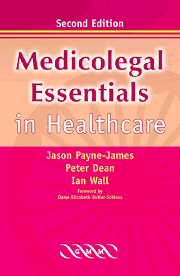Book contents
- Frontmatter
- Contents
- Contributors
- Editors' note for the first edition
- Editors' note for the second edition
- Foreword
- Table of statutes
- Table of cases
- 1 Legal institutions and the legal process
- 2 Human rights and healthcare professionals
- 3 Medical ethics and the forensic physician
- 4 Confidentiality
- 5 Consent to medical treatment
- 6 Professional bodies and discipline
- 7 Complaints in the National Health Service
- 8 The Mental Health Act (England and Wales)
- 9 Death certification and the role of the coroner
- 10 Tissues and organs
- 11 Organ donation
- 12 Living wills
- 13 Euthanasia and end-of-life decision-making
- 14 Abortion and reproductive health
- 15 The Children Act 1989
- 16 Clinical negligence
- 17 Legislation for medicines and product liability
- 18 Clinical trials: ethical, legal and practical considerations
- 19 Medicolegal implications of blood-borne viruses
- 20 Healthcare professionals in court – professional and expert witnesses
- Index
4 - Confidentiality
Published online by Cambridge University Press: 12 January 2010
- Frontmatter
- Contents
- Contributors
- Editors' note for the first edition
- Editors' note for the second edition
- Foreword
- Table of statutes
- Table of cases
- 1 Legal institutions and the legal process
- 2 Human rights and healthcare professionals
- 3 Medical ethics and the forensic physician
- 4 Confidentiality
- 5 Consent to medical treatment
- 6 Professional bodies and discipline
- 7 Complaints in the National Health Service
- 8 The Mental Health Act (England and Wales)
- 9 Death certification and the role of the coroner
- 10 Tissues and organs
- 11 Organ donation
- 12 Living wills
- 13 Euthanasia and end-of-life decision-making
- 14 Abortion and reproductive health
- 15 The Children Act 1989
- 16 Clinical negligence
- 17 Legislation for medicines and product liability
- 18 Clinical trials: ethical, legal and practical considerations
- 19 Medicolegal implications of blood-borne viruses
- 20 Healthcare professionals in court – professional and expert witnesses
- Index
Summary
Ever since the Hippocratic Oath was first taken 2500 years ago, confidentiality has been recognised by the medical profession as a cornerstone of good clinical practice. In 1947, the Declaration of Geneva (amended in 1968) strongly reinforced the declaration of confidentiality in the Hippocratic Oath. The Declaration states:
I will respect the secrets which are confided in me, even after the patient has died.
In recent times legal, social, and technological advances have brought increasingly complex obligations and challenges for healthcare professionals who wish to safeguard patient confidentiality. Under the common law, confidentiality may be enforced by a patient through an injunction or with an action for damages in a civil court, but in the absence of any demonstrable harm, it is likely that the damages awarded would be limited, and civil claims are very rare.
A breach of the Data Protection Act 1998 (vide infra) can result in civil or criminal proceedings.
Disciplinary proceedings based on employment law may follow a breach of confidentiality caused by staff working for the National Health Service (NHS) the primary health provider in the UK. If an NHS healthcare worker breaches confidentiality, alternatively or in addition, he or she may be asked to explain and apologise to a complainant under the patients' complaints procedures.
- Type
- Chapter
- Information
- Medicolegal Essentials in Healthcare , pp. 29 - 38Publisher: Cambridge University PressPrint publication year: 2004



